Sir Cliff's 'love song' to Birmingham celebrated
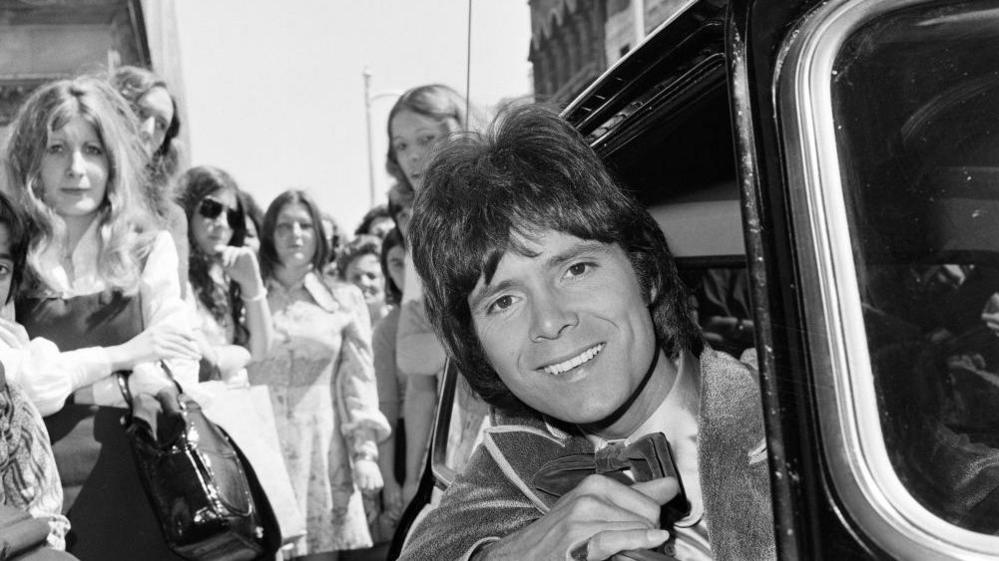
Take Me High was filmed in Birmingham in 1973 and marked the end of Sir Cliff Richard's film career
- Published
It might be described as a "cinematic love song to Birmingham," but Take Me High marked the end of Sir Cliff Richard's film career and almost finished him as a musician, some say.
The "mind bogglingly strange" 1973 film attempts to combine "light musical comedy with the world of local government contract procurement processes", says city author Catherine O'Flynn.
In it, Sir Cliff can be seen piloting a hovercraft along the city's canal, and inventing the legendary Brumburger, external, resulting in a "mildly surreal burger-related parade" through the city.
But, on Friday night there is a screening of the movie, re-styled as Take Me High Bab on posters and T-shirts, at the Mockingbird Cinema, in Digbeth.
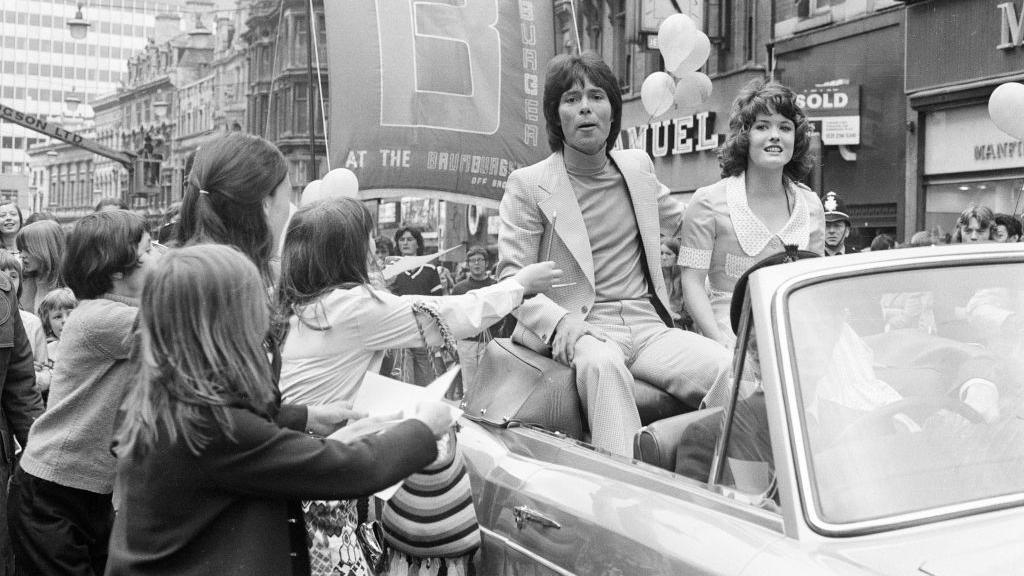
Sir Cliff with co-star Deborah Watling filming procession scenes in Birmingham city centre
Presented by artists Tom Hicks and Dean Kelland, new art works have also been created to celebrate the film.
By the 1970s, Sir Cliff had experienced plenty of film success with productions like The Young Ones, Summer Holiday and Wonderful Life.
'No discernible jokes'
He had also fronted his own hugely successful Saturday night TV show.
But Take Me High was to become his final acting role.
"I think he was at a stalling point in his career," explained Ms O'Flynn. "He could no longer play young lads at a youth club, so I think it was an opportunity to do a grown-up film," she said.
But the film was "a really, really odd vehicle," she added.
"It's like a musical in which none of the songs became hits and a comedy in which there are no discernible jokes."
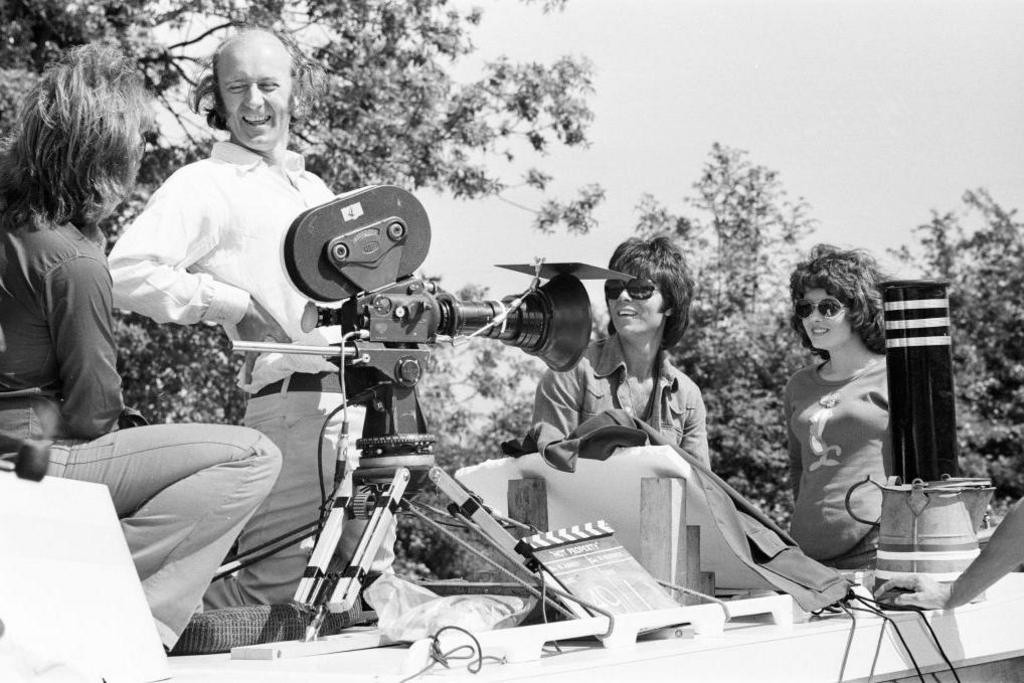
In the film Sir Cliff's character Tim Matthews repurposes a narrowboat as a luxury bachelor pad
In the film Sir Cliff plays a "quite unlikeable" banker Tim Matthews, sent to Birmingham instead of taking up a dream job in New York, explains Mr Hicks, who works under the name Black Country Type.
"He chooses where to live in the city by putting his finger on a map, and ends up in Gas Street Basin," he said.
"He buys a barge which he turns into a '70s luxury canal barge, which is just mad in itself.
"At one point he's in a Mini, just parked up drinking champagne and having a shave, like you do on an average Tuesday morning," he said.
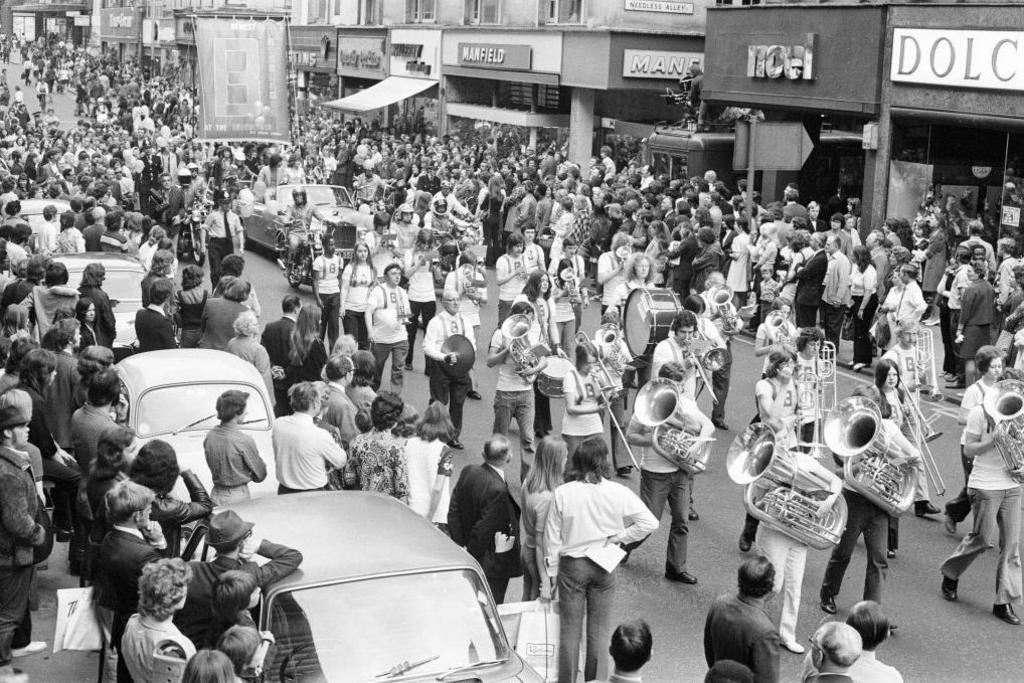
The film includes a "mildly surreal burger-related parade" organisers of the screening say
The plot sees Matthews embroiled in a power struggle between the left wing council leader played by the late George Cole, of Minder and St Trinian's fame, and an aggressively capitalist local businessman.
Then Matthews to decide to set up a hamburger restaurant called Brumburger.
At the time of its release, one reviewer described it as "an attempt to repeat the success of Cliff Richard's early 1960s musicals but done cheaply and weirdly".
"When me and Dean were researching the film, he came across a quote about how it was supposed to resurrect his career, but almost ended up simultaneously finishing his film and music careers," explained Mr Hicks.
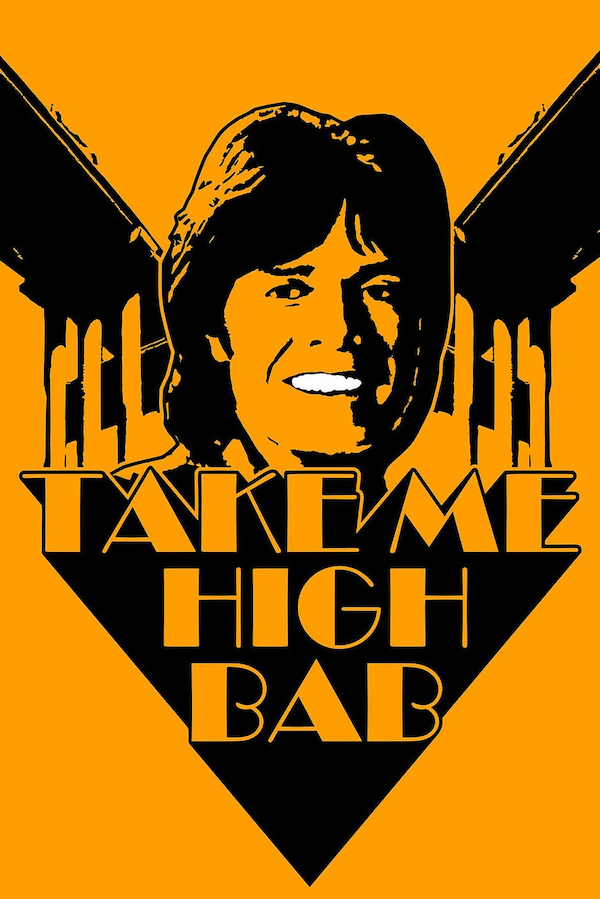
City artist Alfie Hicks has produced new artwork, which will be reproduced on commemorative T-shirts
City as the star
Whilst failing to repackage and rebrand the star, added Ms O'Flynn, the film serves as a memorial to many city landmarks, including its former Brutalist library which was just a few months away from opening when the film was made.
"In a time when Birmingham was only seen through the reductive voices of Benny from Crossroads and Pig from Pipkins, this film allows us to revisit the optimism in the rise of the second city as a post-war Modernist hotspot," added Mr Kelland, who has created new art based on the star.
A commemorative T-shirt has also been produced by city company Punks and Chancers.
"A film of such shonky brilliance demands its own shirt, one that, like the film, centres on Brum and Cliff's magnificent gnashers," added Zoe Darlington from the company.
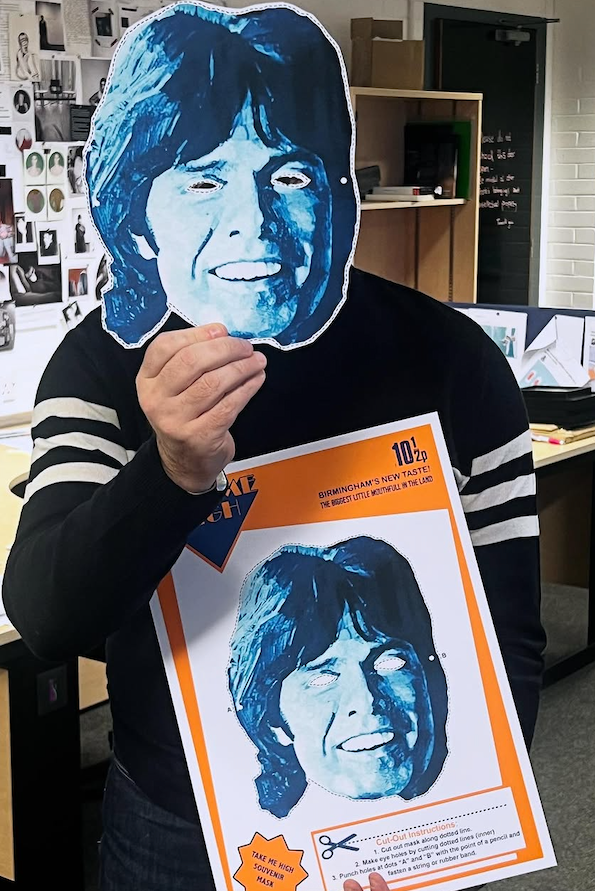
New work by city artist Dean Kelland has been produced for the screening
The film was also prescient in foreseeing which direction the city would turn next, concluded Ms O'Flynn.
His "swanky bachelor pad" narrowboat, "kickstarts the entire process of re-purposing the city's industrial heritage for leisure use," she explained.
"In the film the opening of the Brumburger restaurant is marked with an enormous parade, with marching bands and thousands of frozen-food-eating Brummies staring on open-mouthed," she added.
"Now there are simply too many gourmet/artisan/dirty burger pop-ups opening every week in Birmingham to each warrant their own parade, and each new Brumburger-style offering is celebrated with lurid Instagram portraits instead."
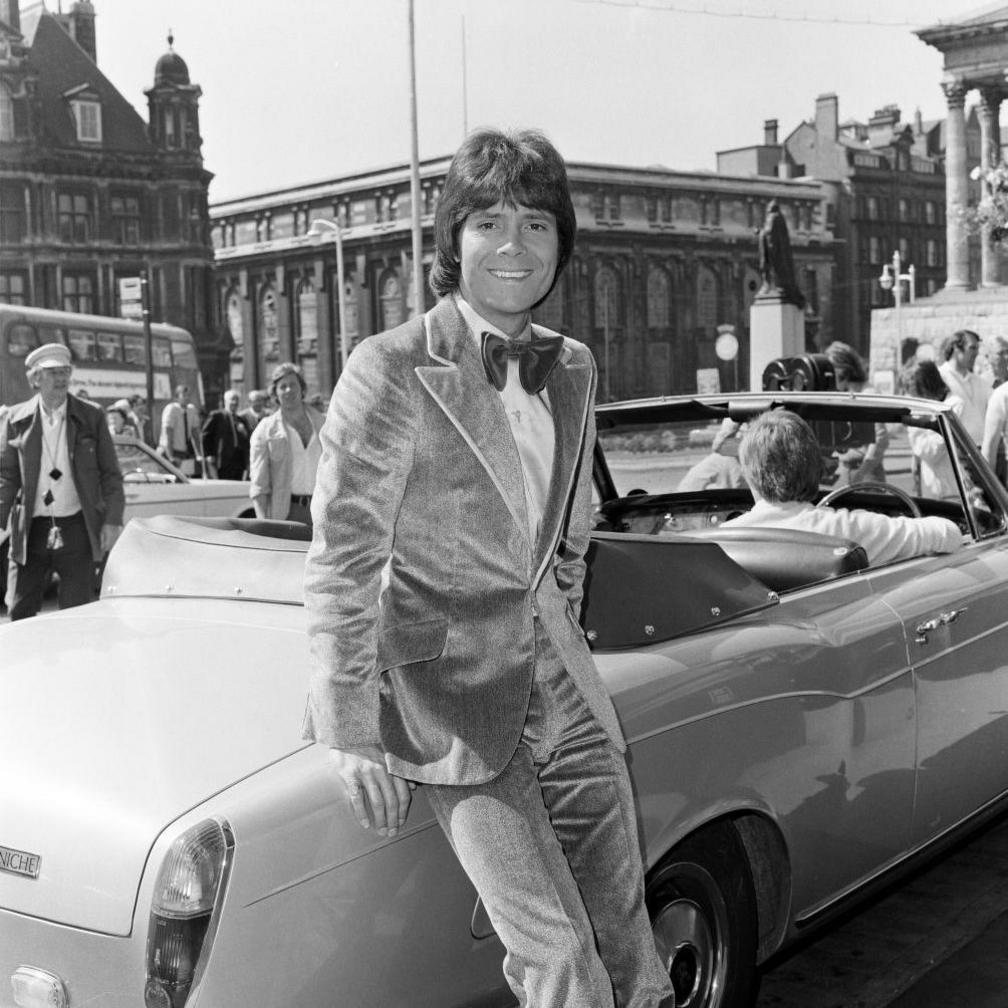
The film serves as a memorial to city landmarks, says author Catherine O'Flynn
Take Me High will be shown at the Mockingbird Cinema, in Digbeth, Birmingham at 20:00 GMT on Friday.
Get in touch
Tell us which stories we should cover in Birmingham and the Black Country
Follow BBC Birmingham on BBC Sounds, Facebook, external, X, external and Instagram, external.
Related topics
- Published6 days ago

- Published10 December 2023
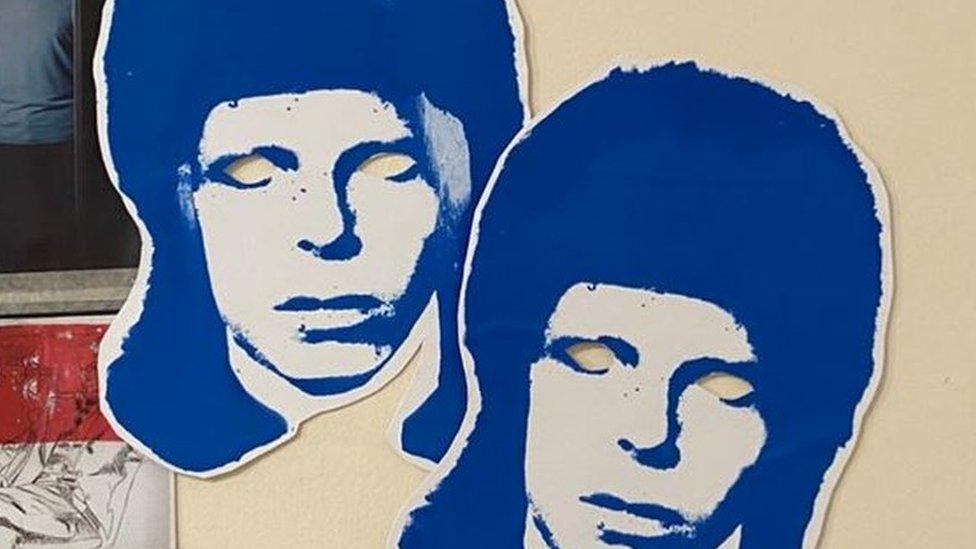
- Published10 September 2023
